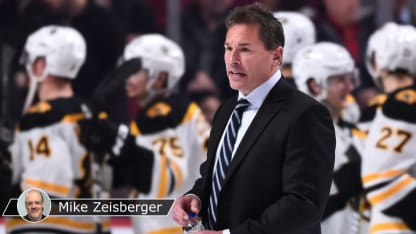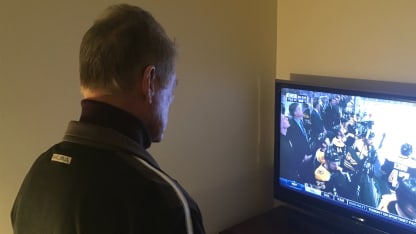Brian Kilrea watching Bruce Cassidy coach the Boston Bruins
The player in question: Jaromir Jagr.
"I learned a lot from that," Cassidy said. "I liked talking hockey with [Jagr]. Some days he did too; some days he didn't. But in no way do I put it on [Jagr] that I lost my job."
Cassidy eventually landed the job coaching Providence, the Bruins' AHL team, in 2008. He was promoted to Bruins coach in 2016, replacing Claude Julien, who led to the Bruins to the Stanley Cup in 2011.
Kilrea sees a lot of Cassidy the player in Cassidy the coach.
"He was one step ahead," Kilreas said. "Certain players have it. [Wayne] Gretzky had it. Like, if you watch replays of Gretzky when he was coming back into his own end, he'd watch which side the puck was going to come on. And if it was chipped out, he'd be there to grab it and lead an odd-man rush. Bruce Cassidy, in the same manner, would read the play before it happened.
"It translates to coaching. He could be behind the bench or I could be behind the bench and sometimes you see a guy who's struggling a little bit and you may have to make a change. Or you might look at the other team and see one of their regulars who is struggling, and you might just say: 'Play off the left side or play off the right side' to force him because he's having trouble. That's the same way with a coach. You see it, recognize it, then do something about it. It's an anticipation.
"Look at his Bruins now. He doesn't have a team with a lot of offensive firepower but he allows his skilled guys to play outside the system. Brad Marchand is an example. He gives him freedom to freelance."
Cassidy said he learned that from Kilrea.
"He would always try to accentuate a player's strength," Cassidy said. "I was an offensive defenseman and he gave me a lot of authority to do what I did best. I try to do the same. (Marchand) is an example. We've had meetings in the summer where I've told him, 'You are too valuable to us to be doing some of that extracurricular stuff you do.' Next thing you know he's thanking me after he got his 100 points.
"I also learned from [Kilrea] that when it goes south, you've got to reel it in. When it comes to your best players, I wouldn't use the term 'call them out,' but you've got to be able in front of the group to say: "This is not acceptable, this is where we draw the line." Then you move on.
"[Kilrea] taught me that too: Be honest with your players. He taught me a lot in the way that I coach."
Cassidy, an Ottawa native, had the chance to deliver that message to Kilrea in person last summer. The two men had a lengthy chat during the Ottawa Valley Hockey Oldtimers Golf Day at the Ottawa Hylands Golf Club on Aug. 10, which was declared Bruce Cassidy Day by Ottawa Mayor Jim Watson.
"I told him to keep doing what he's doing," Kilrea said. "And I let him know I still cheer for all my former players like him.
"Bruce will be fine. He always finds a way."



